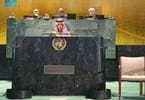Egypt revered him as the real estate/hotel king. Egyptians owed him respect. But now, he owes the Lebanese their pop princess. Where? Presumably in jail, if not, on death row!
Hisham Talaat Mustafa profiles as an Egyptian billionaire, luxury hotel and real estate builder, senator, and just last year…as killer. On September 2, 2008, the businessman and lawmaker was arrested in Cairo, accused of paying his security kill his 33-year old Lebanese mistress Suzanne Tamim. She was found dead July 2008 in her apartment at the Dubai Marina. Tamim, a beautiful pop singer rose to fame in the Arab world after having won the top prize in the popular talent show on television Studio El Fan in 1996.
Earlier reports identified the hitman as Mohsen Al Sukkari, a 39-year-old former policeman from Egypt who carried the murder out for a sum of $2 million from his boss Mustafa. Money was no issue to Mustafa, the chairman of Talaat Mustafa Group, the biggest developer of fine real estate properties in modern-day Egypt including the three Four Season Hotels in Cairo, Alexandria and Sharm El Sheikh.
As the CEO and managing director, Mustafa chaired the Alexandria Real Estate Investment (AREI) Company, spearheading ultra-progressive developments including Al Rehab, San Stefano, the Nile Plaza, Al Rabwa and the Mayfair that changed the face of Egypt. Together with Saudi Arabian Prince HRH Al Waleed bin Talal bin Abdulaziz, chairman of Kingdom Holding and one of the world’s wealthiest, Mustafa built the most stunning Four Seasons Hotel projects in Egypt, two of whom in Cairo’s premium areas, boasting high-end shopping malls, residential apartments, unrivalled restaurants and bars.
Thanks to Mustafa and the Prince of Saudi. Cairo was given an instant facelift across the busy, not-so-appealing Giza Zoo and the historic French attache’s office with the birth of the first Four Seasons Cairo First Residence in town. When Greater Cairo was short of five-star luxury hotels, the 2004 opening of the Four Seasons in the central district in Garden City made the Egyptian capital the only city in the Arab region with two of the most prestigious chain hotels.
Mustafa’s AREI projects with Kingdom Holding also included the construction of the San Stefano complex on Alexandria’s Corniche. The billion-dollar project is a redvelopment of the old San Stefano bought from the government by Mustafa in 1998. It includes the Four Seasons Hotel, a commercial center and parking lot near the beautification area along the Mediterranean coastline near Montazah in Alexandria. Furthermore, Mustafa built South Sinai’s Sharm el Sheikh Four Seasons much to the envy of neighboring hotels including the Ritz Carlton.
Not satisfied with his mega-million, glitzy, ritzy hotel empires, Mustafa thought for a while about the middle and upper-middle class, building them urban communities at Al Rehab. It was his largest project, the largest private sector project of its kind in Egypt. He wanted it to become a trend in the country after he received orders for 6000 accommodations after the first year of launch. Al Rehab was meant to cater to 8 M Egyptians who were to relocate from Cairo to ease the demographic pressures.
All’s well for Mustafa. I interviewed him a few years back about his vision that does not seem to have an end. Until last year’s murder of his girlfriend Tamim. Apparently, Sukkari has worked as a security officer at the Four Seasons Hotel in the Red Sea resort of Sharm el-Sheikh.
The trial of Mustafa and Sukkari resumed in mid-February in Cairo amid tight security measures. Mustafa was recently stripped of his parliamentary immunity in order to face trial, until his arrest he was still into his construction and was of the leading members of the ruling party’s highly influential Policies Committee chaired by Gamal Mubarak, the president’s son and heir apparent.
In some twisted turn of events, five Egyptian journalists were charged with breaching a gag order in the trial. The trial got complicated as Mustafa is not only a powerful businessman, but also a member of President Hosni Mubarak’s ruling party.
On February 26, the Egyptian judiciary was asked to overturn a court decision imposing a fine on journalists for violating a ban on media coverage of a murder trial, the Committee to Protect Journalists said. During the hearing, the Sayyida Zainab Misdemeanors Court sentenced Magdi al-Galad, Yusri al-Badri, and Faruq al-Dissuqi, respectively the editor and reporters of the independent daily Al-Masry20Al-Youm; Abbas al-Tarabili, editor of the opposition daily Al-Wafd, and reporter Ibrahim Qaraa to a fine of 10,000 Egyptian pounds (US$1,803) each. They were found guilty of violating a November 2008 court decision banning media coverage of the trial, said Marwan Hama-Saeed, Research Associate, Middle East and North Africa Program, The Committee to Protect Journalists.
“We are dismayed by this latest politically motivated court ruling and call on the Egyptian judiciary to overturn it on appeal,” said Mohamed Abdel Dayem, CPJ’s Middle East and North Africa program coordinator. “We also urge President Mubarak to end the rising attacks on independent and opposition papers and to bring Egyptian legislation in line with international standards for freedom of expression, as he has repeatedly pledged to do.”
Sayyid Abu Zaid, lawyer for the Egyptian Journalists Syndicate told CPJ, that a similar case filed against the state-owned dailies Al-Ahram and Akhbar Al-Yawm for violating the ban on media coverage of the Mustafa case was dropped by prosecutors last November. Essam Sultan, another lawyer for the defendants, recently told Egypt’s English-language Daily News that the decision to pursue Al-Masry Al-Youm and Al-Wafd but not the state-owned papers indicates a double standard, said Saeed.
“This ruling is shocking,” said Abu Zaid. “It deals a harsh blow to journalists’ right to gather information and to cover cases of public interest.” He described the ruling as a “dangerous precedent” and a “prescription for more blackouts on corruption cases involving influential figures and businessmen” that are close to Mubarak’s ruling National Democratic Party.






















